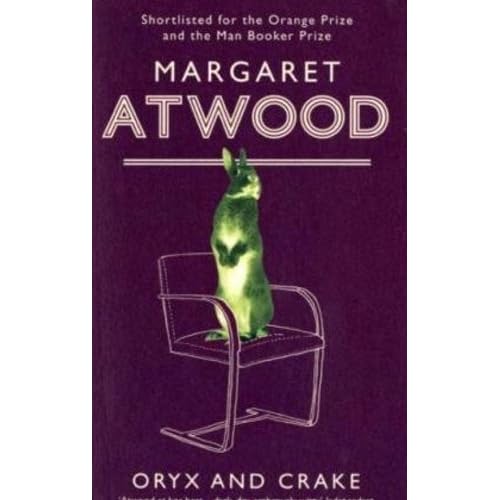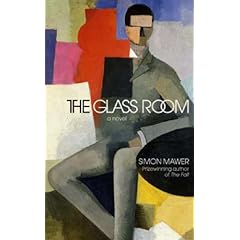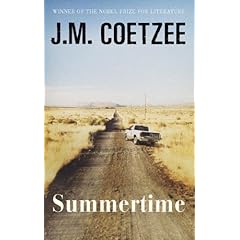 In January 2009, I was introduced to the wonderful world of David Mitchell by a friend, who lent me the surreal number9dream - a book I absolutely loved. She proceeded to lend me Cloud Atlas next, and it's been sitting abandoned on my unread shelf for about a year now, as I've been reluctant to pick it up for a myriad of reasons - book bloggers everywhere rave about it calling it a favourite, it's considerably chunky at 529 pages, and, well, it's Mitchell's most acclaimed book yet.
Anyhow, I finally picked it up about a week back, and rode the long roller-coaster that is this book - it's a heck of a ride, you're almost begging for it to finish (as, all said and done, it is a difficult book to read), but when you eventually do turn the last page, you want to experience it all over again.
In January 2009, I was introduced to the wonderful world of David Mitchell by a friend, who lent me the surreal number9dream - a book I absolutely loved. She proceeded to lend me Cloud Atlas next, and it's been sitting abandoned on my unread shelf for about a year now, as I've been reluctant to pick it up for a myriad of reasons - book bloggers everywhere rave about it calling it a favourite, it's considerably chunky at 529 pages, and, well, it's Mitchell's most acclaimed book yet.
Anyhow, I finally picked it up about a week back, and rode the long roller-coaster that is this book - it's a heck of a ride, you're almost begging for it to finish (as, all said and done, it is a difficult book to read), but when you eventually do turn the last page, you want to experience it all over again.
The book comprises of six independent stories, that span centuries and the atlas, of which five are told in "halves," revolving around the central tale of the post-apocalyptic future, where humans are living as savages, after The Fall. In the first set of "halves", which goes chronologically, each story is read/seen by a character in the subsequent one. In the second set, the stories start moving backwards, so the characters end up reading/seeing the story that follows. Hence, the opening chapter of the book (the first incomplete half-story) is completed in the last chapter.
The common theme that runs through the book is the presence of a "comet-shaped birthmark" - a distinction present in the protagonist of each story. Does this suggest reincarnation? The existence of the soul across generations? Or, is that merely coincidental?
Souls cross ages like clouds cross skies, an’ tho’ a cloud’s shape nor hue nor size don’t stay the same it’s still a cloud an’ so is a soul. Who can say where the cloud's blowed from or who the soul'll be 'morrow?
The Pacific Journals of Adam Ewing {1850s} : A journal written by an American notary in the Pacific, who befriends an English surgeon as well as a stowaway Moriori. This story is cut off mid-sentence (and comes together nicely as the last chapter)...
Letters from Zedleghem {1931} : A young aspiring bankrupt composer, Robert Frobisher, goes to Belgium to apprentice with a famous composer, hoping to make some easy money, and simultaneously finding some success. Here, he discovers The Pacific Journals in the library...
Not only are there some romantic (and otherwise) twists in the tale, but, as Frobisher details his life in the Belgian estate to an old friend, Sixsmith (in the form of letters), the reader is introduced to Frobisher's biggest work, revolutionary or gimmicky: The Cloud Atlas Sextet.
Half Lives : The First Luisa Rey Mystery {1970s} : We move across the pond for this one, where Luisa Rey is a journalist, and is focusing on a big expose on the Swannekke Island Nuclear Plant in California. Sixsmith is the scientist who gave her the lead for the story, and in time, she reads the letters written to him by Frobisher. Luisa, trying to follow in her father's footsteps, seems to be hellbent on justice (consequentialism), even if it is at the expense of her own life.
The Ghastly Ordeal of Timothy Cavendish {present-day} : The focus shifts to present-day United Kingdom, where Timothy Cavendish is a struggling not-so-moral publisher, but, when he is tricked into admitting himself in an old-age home, with no way out, he starts trying to figure out the best way to escape, which leads to more trouble for him. A manuscript of The First Luisa Rey Mystery was sent to him by an author, and he's contemplating publishing it...
An Orison of Somni 451 {near future} : In this dystopia, where fabricants are slaves to purebloods, Somni 451 has ascended, and managed to develop her own personality, by acquiring immense knowledge. It's a story about the struggle of powers, the violence that emerges and the unfortunate state of things as they stand. She's not a partaker though, merely an observer, who recites her life-story to an Archivist. She was watching the film of Timothy Cavendish, when she was taken away...
Sloosha’s Crossin’ an’ Ev’rythin’ After {Post-apocalyptic future} : Zach'ry is the protagonist here, in a civilisation that considers Somni god, and Ol' Georgie the devil. Zach'ry and his family are savages, in awe of the Smarts, believing that the Soul either reincarnates or gets set to stone. Technology is a myth in this civilisation, and, the people mainly herd goats or the like, living in tribes in forests, fearing invasion and power struggles by the terrifying Kona.
This book is immense - the writing style in each of the stories changes significantly, so much so that they read as completely different stories : from Victorian formal english, peppered with ampersands and other shorthands, to pidgin english which I personally found quite annoying to read. However, each style seems to reflect the age it it set in, appropriately, as well as, the structure of each story seems to be similar to its genre. For example, the Luisa Rey mystery is written in numerous short chapters, much like an airport thriller, whereas, the post-apocalyptic narration is written as a rather long rant.
The common theme that binds these stories together soars above and beyond the comet-shaped birthmark. It's a story about power, domination, and the ultimate quest to rule. The stories stress on the selfishness of people, and how ultimately, this will lead to the inevitable apocalypse.
Yes, the devil shall take the hindmost until the foremost is the hindmost. In an individual, selfishness uglifies the soul; for the human species, selfishness is extinction.
While I enjoyed this book, parts of the stories just didn't grab me, and I was left quite unsure as to what's going on, and how these stories are inter-linked together. Why isn't it just a book of short stories? A much less author might have done that... or, attempted six different novels, with completely different themes. However, Mitchell, managed to tie most of the loose ends together, and left me questioning my own existence, and the power of one individual. It's an ambitious work, but, in my opinion, Mitchell's managed to pull it off surprisingly well.
 Oh, for such a small novella (tautology?), The Driver's Seat covers so much, with a dark plot, completely mental characters and just bizarreness all around! Lise, a thirty-something year old woman, is stuck in a dull office job for a decade or so, and she's about to embark on her first vacation. At the very outset, we discover that Lise is completely and utterly nuts. Like flips out in a shop, while looking for a dress to travel in, when the salesperson tells her it's made from stain-resistant material... so much so that she walks out of the store, as she is affronted by the insinuation that she does not eat properly.
When she finally finds an outfit to wear ("a lemon-yellow top with a skirt patterned in bright V's of orange, mauve and blue.' and a coat over the top 'narrow stripes, red and white with a white collar") during her travels, the reader is left truly bewildered, by the sheer garishness of it, which she justifies easily.
Oh, for such a small novella (tautology?), The Driver's Seat covers so much, with a dark plot, completely mental characters and just bizarreness all around! Lise, a thirty-something year old woman, is stuck in a dull office job for a decade or so, and she's about to embark on her first vacation. At the very outset, we discover that Lise is completely and utterly nuts. Like flips out in a shop, while looking for a dress to travel in, when the salesperson tells her it's made from stain-resistant material... so much so that she walks out of the store, as she is affronted by the insinuation that she does not eat properly.
When she finally finds an outfit to wear ("a lemon-yellow top with a skirt patterned in bright V's of orange, mauve and blue.' and a coat over the top 'narrow stripes, red and white with a white collar") during her travels, the reader is left truly bewildered, by the sheer garishness of it, which she justifies easily.
 It was in
It was in  There's a thin line between reality and fiction; they oft' reflect each other very closely, so much so that the line is indiscernible. But - what happens when reality starts imitating fiction?
That's the basic premise of Spark's 1981 novel, starring Fleur Talbot: an aspiring writer in London in the 1950s. She's writing her first novel, Warrender Chase, but she needs a job to get by while she finishes it. And so, she takes up the position of the secretary to Sir Quentin Oliver, and his brainchild: The Autobiographical Association.
There's a thin line between reality and fiction; they oft' reflect each other very closely, so much so that the line is indiscernible. But - what happens when reality starts imitating fiction?
That's the basic premise of Spark's 1981 novel, starring Fleur Talbot: an aspiring writer in London in the 1950s. She's writing her first novel, Warrender Chase, but she needs a job to get by while she finishes it. And so, she takes up the position of the secretary to Sir Quentin Oliver, and his brainchild: The Autobiographical Association. Sarah Waters' The Night Watch is the third novel I've read by her, and it's as different as the previous two as it can be. While one was a gothic ghost story set in Warwickshire (
Sarah Waters' The Night Watch is the third novel I've read by her, and it's as different as the previous two as it can be. While one was a gothic ghost story set in Warwickshire ( In January 2009, I was introduced to the wonderful world of David Mitchell by a friend, who lent me the surreal
In January 2009, I was introduced to the wonderful world of David Mitchell by a friend, who lent me the surreal 



 And so, my Booker shortlist (2009) journey continues with Coetzee's fictional memoir, which completes the trilogy, already containing
And so, my Booker shortlist (2009) journey continues with Coetzee's fictional memoir, which completes the trilogy, already containing  This is the first book on the Booker shortlist that I've tackled this year, and I have to admit that my opinion on the book remains ambivalent. Having finished
This is the first book on the Booker shortlist that I've tackled this year, and I have to admit that my opinion on the book remains ambivalent. Having finished 
 Set in Papua New Guinea, in the 1990s, this book is narrated by Matilda, an adolescent, who witnesses the horrors of civil war first hand. The book opens with many people fleeing the island, and it being lost to the outside world, as the 'redskins' (the government soldies) and the 'rambos' (rebels) advances.
Set in Papua New Guinea, in the 1990s, this book is narrated by Matilda, an adolescent, who witnesses the horrors of civil war first hand. The book opens with many people fleeing the island, and it being lost to the outside world, as the 'redskins' (the government soldies) and the 'rambos' (rebels) advances. It's the 1860s, and Lant Street, a dodgy street near Southwark Bridge, is inhabited by petty thieves, small-time burglars, piddling swindlers and the like. Here lives Sue Trinder, a seventeen year old, with Mrs. Sucksby (her guardian), and Mr. Ibbs (a man who fences stolen items), along with a bunch of infants, unwanted in this world, who Mrs. Sucksby brings up and introduces to the world of small crime; and, some adolescent pickpockets (or, "fingersmiths", if you like).
It's the 1860s, and Lant Street, a dodgy street near Southwark Bridge, is inhabited by petty thieves, small-time burglars, piddling swindlers and the like. Here lives Sue Trinder, a seventeen year old, with Mrs. Sucksby (her guardian), and Mr. Ibbs (a man who fences stolen items), along with a bunch of infants, unwanted in this world, who Mrs. Sucksby brings up and introduces to the world of small crime; and, some adolescent pickpockets (or, "fingersmiths", if you like).